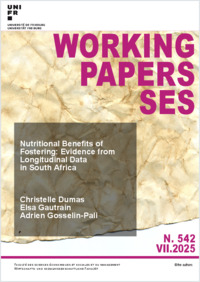Nutritional Benefits of Fostering : Evidence from Longitudinal Data in South Africa
BP2-STS
- Dumas, Christelle ORCID University of Fribourg
- Gautrain, Elsa ORCID University of Fribourg
- Gosselin-Pali, Adrien Université Clermont Auvergne, CNRS, IRD, CERDI, F-63000 Clermont-Ferrand, France
- 2025 ; Fribourg : FSES
44 p.
English
In sub-Saharan Africa, child fostering—a widespread practice in which a child moves out of the household of her biological parents—can have significant implications for a child’s overall well-being. Using longitudinal data from South Africa that includes individual tracking, we employ double machine learning techniques to evaluate the impact of fostering on nutrition, addressing biases related to selection into treatment and endogenous attrition, two common challenges in the literature. Our findings reveal that fostering reduces the probability of being stunted by 6.8 percentage points, corresponding to a 37 percent reduction compared to the mean prevalence. This improvement appears to be driven by foster children relocating to smaller, rural households, often including retired individuals, typically grandparents, who receive a pension. Furthermore, we find that it not only enhances the nutritional status of foster children but also benefits the nutrition of other children from sending households, suggesting that fostering can be mutually beneficial for both groups.
- Collections
- Faculty
- Faculté des sciences économiques et sociales et du management
- Language
-
- English
- Classification
- Economics
- Series statement
-
- Working Papers SES ; 542
- License
- Open access status
- diamond
- Identifiers
-
- DOI 10.51363/unifr.ewp.f5r34c
- ISSN 3042-7517
- Persistent URL
- https://folia.unifr.ch/unifr/documents/332369
Statistics
Document views: 277
File downloads:
- WP_SES_542: 110
